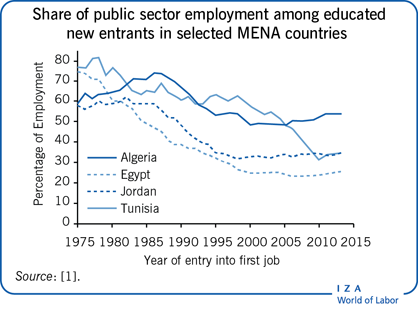Elevator pitch
Public sector hiring has been an essential component of the social bargains that have maintained political stability in the Middle East and North Africa (MENA). As these bargains eroded, public sector workforces contracted in relative terms owing to a partial freeze on hiring and the promise of lifetime job security for incumbent workers. This had profound effects on the age composition of the workforce. The upcoming retirement of many workers provides an opportunity to restructure public sector hiring to emphasize meritocratic recruitment processes and performance-based compensation systems.
Key findings
Pros
Slowed hiring and an aging workforce in the public sector offer an opportunity to carry out necessary civil service reforms.
Increased access to education for women has resulted in an increasing feminization of public sector workforces in the MENA region.
The erosion of social contracts linking public sector hiring to political stability provides an opportunity to transition to more meritocratic hiring practices.
Civil service hiring reforms have the potential to improve the quality of public administration and service delivery.
Cons
Public sectors in the MENA region remain large, which leads to deleterious effects on both budgetary sustainability and administrative efficiency.
The slowdown in hiring within the public sector contributed to high rates of educated youth unemployment, particularly among young women.
Political pressures post-2011 to address youth unemployment have led some policymakers to resume inefficient public sector hiring to placate politically sensitive groups.
